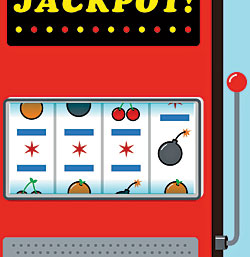
photo: Antonio Perez/ Chicago Tribune
Thousands arrive for the opening of the new Rivers Casino in Des Plaines in 2011.
As Illinois’s state lawmakers wrap up their spring session with a last-minute flurry of activity and negotiation, it’s a fairly sure bet that a gambling expansion bill will be part of this frenzy, as it has been in every session in recent years.
Of all the ideas in the current bill (SB 1739) that’s stuttering along in Springfield—which would add five new gambling halls statewide and thousands of slot machines at racetracks and airports—the most controversial is probably a city-owned-and-operated casino in downtown Chicago. Its backers, including Mayor Emanuel, claim that it could add thousands of jobs and pump $100 million or more a year into the city’s empty coffers.
But this idea is risky. Details of how a city-owned casino would be run remain unclear, as is where the thing might be built (the latest rumor names the former Michael Reese Hospital site). Based on what we do know, five main problems emerge:

Illustration: Oliver Munday
There’s no road map.
With the exception of a quirk in Kansas law that technically vests casino ownership with the state, a government-run casino has never been tried before in the United States—not in Las Vegas, not in Atlantic City, not anywhere gaming has exploded over the past two decades. Public casinos do exist in some other countries: Canada, for example, has facilities in multiple provinces that generate more than $8 billion annually for governments, charities, and Native American tribes. However, they’re generally run not by the provinces but by private operators to whom the local governments contract the job. If you think the city of Chicago often struggles to do a good job with such basic tasks as filling potholes, how is it going to suddenly become expert at running a complicated business enterprise?
Public access would be an issue.
Private businesses have wide discretion over which customers they can let in—or keep out. Velvet ropes at nightclubs, for example, let owners admit the crowds they want, to cultivate an atmosphere that will get high rollers in and spending. You don’t see public libraries telling homeless people to get lost. They can’t. Any attempt to chuck potential nuisances off city property is apt to generate more lawsuits than jackpots. Mark Weinberg, a Chicago attorney who has sued the city over its treatment of panhandlers, says a city-owned casino could probably impose “reasonable restrictions” on any undesirables inside the facility, but thorny questions remain about excluding unwanted guests who aren’t causing trouble.
It would be hard to keep regulars happy.
Successful casinos rely heavily on cadres of regular players who are awarded points based on how much and how often they wager. Those points are then turned into “comps”—free meals, hotel rooms, show tickets, vacations, and so on. To provide those perks, the city would have to control hotels, restaurants, and the like—putting it in direct competition with existing businesses. What’s more, given that Indiana and a handful of other states already garnish some winnings from deadbeat parents, what’s to stop Chicago from trying the same trick with less urgent collections, such as delinquent water bills or unpaid parking tickets?
The market is already saturated.
It has become painfully apparent from the stagnation in statewide revenue that the gambling pie is not growing to any significant degree; the state’s share rose by around 5 percent last year, the casino industry’s first increase since 2005. When new casinos open, they invariably rely on luring customers away from existing ones. A downtown casino would hurt not just casinos in Indiana but those in the Chicago suburbs. Consider what happened after the 2011 opening of the Rivers Casino in Des Plaines (now the state’s biggest, with $417 million in revenues last year): The take at the four other Chicago-area casinos (Aurora, Elgin, and two in Joliet) sank by 13 percent in 2012 compared with the previous year.
The fox would guard the hen house.
In any business, disputes with customers sometimes arise. When that business is a privately owned casino, government regulators are the arbiters, setting and enforcing the rules of fair play, says Anthony Cabot, a gaming attorney in Las Vegas. But what happens when the government (in other words, the regulators) owns the casino? “When a dispute at a table becomes a dispute between the government and a player,” says Cabot, “that would be problematic.”
As problematic as splitting face cards in blackjack.



Comments are closed.